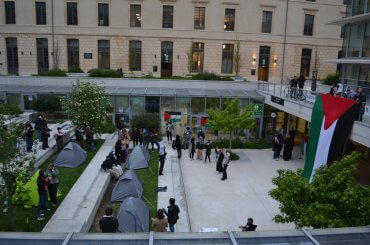
I am also about to do a post on Herzl’s colonialism; it was his go-to word in his Diaries to describe his project. Who in the third world is down with colonialism? And my point about Partition being over is that everyone in Washington now seems to glimpse the death of the two state solution, and they’re panicking, for different reasons (Realists fear bloodshed, there’s an international consensus for 2 states, and there are plenty of Zionists in DC); but at some level I have to believe that Palestinians are happy about this development. The burden now shifts to a struggle for equal rights in historical Palestine.
Also, what was Partition? A 63-year shell game. It was never Partition, it just meant occupation for them, and plenty of bloodshed, even as Kosovo and Pakistan and Tajikistan walked in and got their states at the Horn and Hardart. I do think Zionists will look back on the last ten years and understand that the biggest missed opportunity of all was the Arab peace initiative, realpolitik from a group of authoritarian states, to cut the deal. But Israel didn’t want to cut it (because they don’t believe in Partition), and the lobby gave them the power to walk away. National suicide, as Ehud Olmert and John Mearsheimer put it.
Anyway, here is some evidence for my belief that the Palestinians are going to win. Chris Keeler at Notes from a Medinah says what I have always believed, that Palestinians had an important role in rejecting Clinton’s parameters of 2000. The talking points on the pro-Palestinian side always blame the Israelis for the bad deal. OK, it was a bad deal, Clinton was hashing things together to save his legacy, Barak could not move on Jerusalem. But I have to believe that some important part of Palestinian life didn’t want any deal because they don’t want to memorialize an Israel cleansed of Palestinians and give up the right of return. If you have met Palestinians, you know that they are all for the right of return; and you would be too. People say I’m living in fairyland or I’m a nihilist, but I think this is the ultimate realism: You can’t make a final deal here without dealing openly and fairly with that basic right. Even if you want Israel to exist, you have to deal with that right…
I took the picture above in Bil’in, at Dr. Rateb Aborahma’s house, the head of the popular committee in the village. The key says 62 for 62 years. I.e., the Bil’in struggle is not just about the occupation, about land stolen after 67.
Here is Keeler, saying that the right of return is central, and Arafat had to reject Camp David on that basis. He begins with this idea that is in the news, other states recognizing a Palestinian state on the ’67 lines.
Yet what does international recognition actually symbolize for the Palestinians? Sure it means that the West Bank and Gaza would constitute a Palestinian state, but more importantly, it revitalizes the Israeli denial of the Nakbah of 1948. Any two state solution will have one major Israeli precondition: no right of return for Palestinian refugees of 1948. Furthermore, the two state solution is completely premised on the assumption that the Israeli-Palestinian conflict finds its roots in 1967. To recognize Palestine along 1967 borders is to play an active role in the erasure of the catastrophe, in which 531 Palestinian localities and villages were ethnically cleansed, destroyed and buried under the guise of heroic Israeli nationalism.
Unfortunately, international observers do not seem to understand the emotional resonance that 1948 holds for all Palestinians. In 2001, when Arafat rejected a substantial two state peace plan because it did not include the right of return, he was castigated in the US and Israel for not wanting peace. He wanted peace, but he also wanted justice for the over 7 million dispossessed refugees that are scattered across the Middle East. The Right of Return for Palestinians is sacred. It is not something that can be negotiated away nor can it be denied. It is a right that is enshrined in the UN, under Resolution 194:
“(The General Assembly) Resolves that the refugees wishing to return to their homes and live at peace with their neighbours should be permitted to do so at the earliest practicable date, and that compensation should be paid for the property of those choosing not to return and for loss of or damage to property which, under principles of international law or in equity, should be made good by the Governments or authorities responsible.”
It is clear that Israel will continue to postpone this legal right of Palestinians, a right that could be indefinitely postponed should a two state solution be forged. International recognition of 1967 borders certainly symbolizes the illegality and brutality of the Israeli occupation (as well as the American failure to remain neutral), but it uses the Israeli line as a foundation for peace. If Brazil and Argentina truly support the rights of Palestinians, there would be a greater push to recognize the Palestinians’ Right to Return, rather than burying this right under 1967 recognition.

